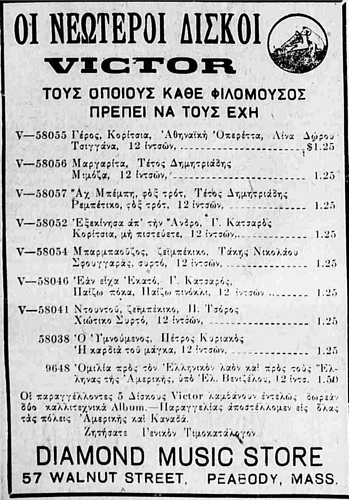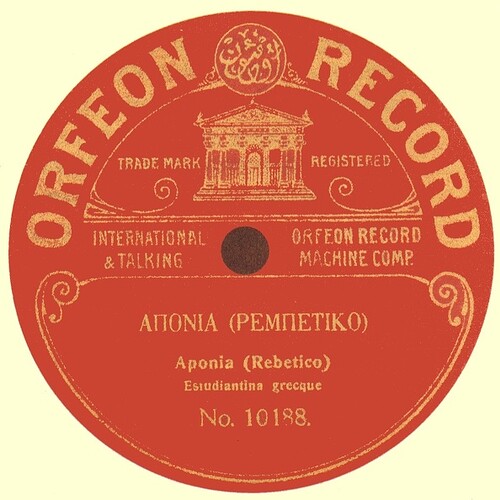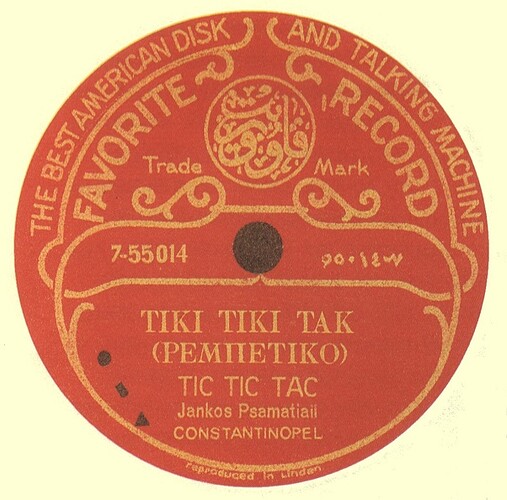REPORT ON VISIT TO GREECE APRIL-MAY 1930
by Edmund Michael Innes
Edmund Michael Innes - Repo… 3 by on Scribd
REBETIKA
CHARACTER OF THE DEMAND
The Greek record must be loud. Greek people must have the impression when buying a record that they get something worth the money they give. They do not care about the wear. The record must be loud, full of brilliancy and noise, and not a dead thing. They also want to hear the words.
The lowest class of the population - 60%, are interested in all Greek records, but popular titles, traditional or otherwise, are in greatest favour. Rebetika appeal to everybody; Kleftika, folk songs, and folk dances, mostly to country people; Manedes to north eastern people, to the refugees and generally to those who used to live in Turkish territory. They like also Cantades and Greek Operettas and musical comedies, especially with comic duets, and generally any comic monologue or dialogue ending with a chorus or a refrain. Tango, not as a dance, but as a song, also appeals to most people and generally any song with sentiment and passion. It cannot be said that they have one special author in great favour, although Hadjiapostolou is likely to become a great favourite.
The middle class - 30% - have an extensive knowledge of music, but are not difficult to satisfy. They prefer European music, but when they belong to the country, they always take a great pleasure in Kleftika, folk songs, folk dances, and they like Rebetika and comic songs, not for the song itself, but as a sort of light and comic entertainment. The light sort of European music is the mos
Records of Hawaiian guitars are extremely popular. The artistes most in favour among this class of population, are: Caruso, Titta Ruffo, Chaliapin, Fleta, Schipa, Stracciari, Galli-Curci, Dal Monte. Gigli and Martinelli enjoy less favour by comparison. Heifetz, t preferred:
Italian Opera: Rigoletto ranks first, Barbiere, Trovatore, Lucia, Tosca, Aida, Traviata, Ernani, Pagliacci, Cavalleria. (Most people call that classical music!)
Viennese Operetta: Kalmán, Lehár and Strauss: Czardasfürstin, Eva, Walzertraum, etc.
Greek Operettas and Musical Comedies of Sakellaridis, Hadjiapostolou, Constandinidis, Martino, Vitali (who has been our Maestro for the last two sessions), Comninos.
Cantades, Serenades, Italian and modern Greek songs, Mandolinades.
Western dance music: Tango is in exceedingly great favour as dance and still more as song. Foxtrot is still in favour but not with the same vogue as before. For dance and theme songs of films, there is a demand preceding the actual performance in Greece from people who heard of the hits from Paris, London or Berlin. Kreisler, Thibaud, Paderewski, Lewitski, Philadelphia Symphony Orchestra are other artistes of ours in favour
in Greece. For Greek artistes: Lappas (Columbia) ranks before our Angelopoulos mostly by the means of an intense advertising; then come Angelopoulos, Xirellis, Epitropakis and Madame Epitropakis.
The high class - 10% - is very little educated musically, is very snobbish and follows the dictations of the fashion. They despise whatever is Greek although in their hearts they remain faithful to the Greek popular music which they do not buy for fear of opinion. They buy all kinds of Western music above mentioned, a little of the classical repertoire: Grieg, Brahms, Liszt, and a good many Tangos and Foxtrots.


